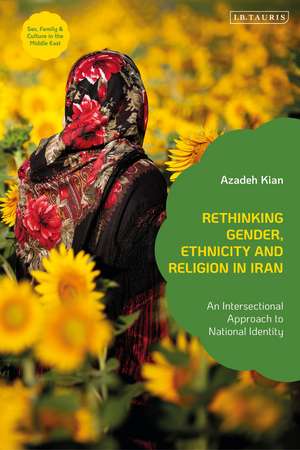Rethinking Gender, Ethnicity and Religion in Iran: An Intersectional Approach to National Identity: Sex, Family and Culture in the Middle East
Autor Azadeh Kianen Limba Engleză Hardback – 9 aug 2023
Preț: 511.48 lei
Preț vechi: 731.83 lei
-30% Nou
Puncte Express: 767
Preț estimativ în valută:
97.87€ • 102.55$ • 80.91£
97.87€ • 102.55$ • 80.91£
Carte tipărită la comandă
Livrare economică 11-25 aprilie
Preluare comenzi: 021 569.72.76
Specificații
ISBN-13: 9780755650255
ISBN-10: 0755650255
Pagini: 280
Dimensiuni: 156 x 234 mm
Greutate: 0.56 kg
Editura: Bloomsbury Publishing
Colecția I.B.Tauris
Seria Sex, Family and Culture in the Middle East
Locul publicării:London, United Kingdom
ISBN-10: 0755650255
Pagini: 280
Dimensiuni: 156 x 234 mm
Greutate: 0.56 kg
Editura: Bloomsbury Publishing
Colecția I.B.Tauris
Seria Sex, Family and Culture in the Middle East
Locul publicării:London, United Kingdom
Caracteristici
Based on quantitative and qualitative surveys conducted by the author with data from over 7000 women from the urban and rural areas in Baluchistan and Golestan and 100 interviews conducted from 2004-2008
Notă biografică
Azadeh Kian is Distinguished Professor of Sociology and Gender Studies at the Université Paris Cité, France. She is also Director of the Center for Gender and Feminist Studies and Research and its journal Les Cahiers du CEDREF, and former Director of the Social Science Department (2017-2021) at the Université Paris Cité.
Cuprins
Introduction 1. Crafting Iranian Nationalism: Intersectionality of Ethnicity, Gender and Religion2. Baluchistan: 1950s-20213. Golestan: When Turkmen Sunnites Participate in the Othering of Baluch Migrants4. The Impacts of Structural Transformations5. Gender and Work, Gender and PoliticsConclusion Bibliography
Recenzii
Azadeh Kian offers a path-breaking, brilliant feminist analysis of nationalism in Iran. Her rich, innovative reading displaces dominant presuppositions, categories, foci and methods. Kian makes central otherwise habitually invisible subaltern Iranian women, and gender, class, religious and ethnic relations of power. She ingeniously combines previously unheard women's narratives from her fieldwork, and quantitative data.
Of the many interesting insights into how Gender, Ethnicity and Religion in Iran intersect, the most valuable is in the detailed historical background that links the formation of Iran as a nation and the push for modernity all the way to the Islamic Republic and its problems with ethnic minorities and women today.
Azadeh Kian offers a fresh critical look at the category of woman in the Iranian context by analysing gender, class, ethnicity and religion, and reminding us once again that 'womanhood' is not a homogenous category. This timely contribution considers the power structures existing among women within the patriarchally shaped society which so far has largely been neglected.
Of the many interesting insights into how Gender, Ethnicity and Religion in Iran intersect, the most valuable is in the detailed historical background that links the formation of Iran as a nation and the push for modernity all the way to the Islamic Republic and its problems with ethnic minorities and women today.
Azadeh Kian offers a fresh critical look at the category of woman in the Iranian context by analysing gender, class, ethnicity and religion, and reminding us once again that 'womanhood' is not a homogenous category. This timely contribution considers the power structures existing among women within the patriarchally shaped society which so far has largely been neglected.




